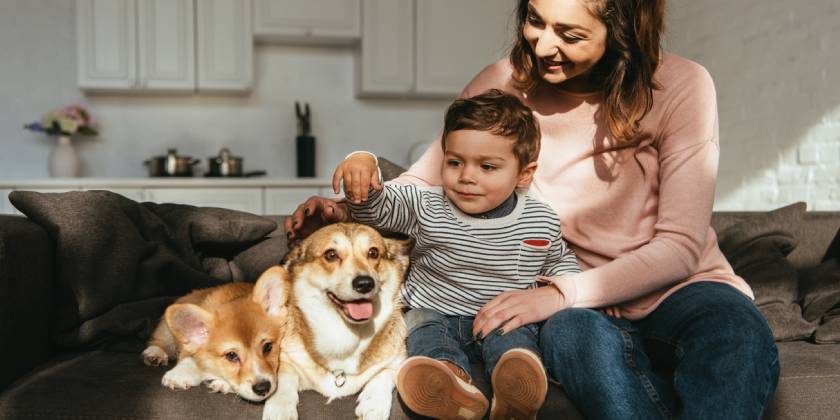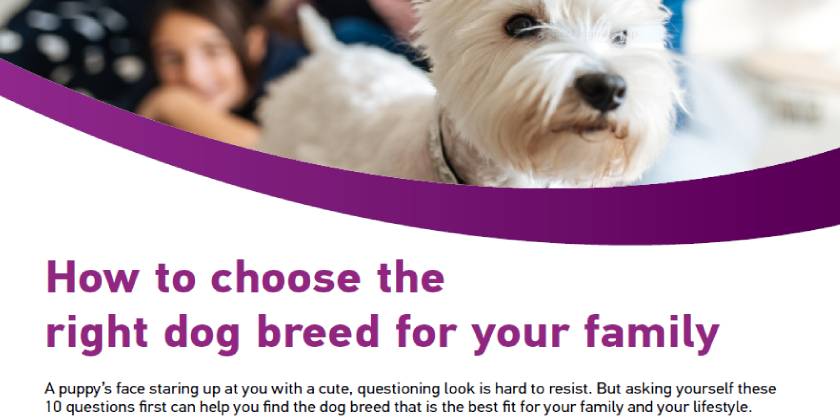7 steps to choose the right dog for your family [Checklist]

What steps do you need to take to choose the right dog for your family? If you’re ready to add a puppy or rescue dog to the family, there are many things to consider. Almost eight in 10 of us say family life is less stressful thanks to our pets. However, to ensure dog ownership is a real walk in the park, spend a little time thinking about the breed that’s right for you and your family.
Here are seven important considerations to run through so you can find your perfect match, or download Real Insurance's checklist How to choose the right dog breed for your family.

1. Focus on temperament
A dog’s temperament – and the amount of patience and training required to manage that temperament – should be a key consideration when looking for a furry friend.
Do some research on the dog breed’s origins and what the dog was originally bred for by speaking to breeders. If you’re considering a rescue dog or puppy, refer to associations and forums for this kind of information.
Ask plenty of questions about the breed. Is it a working dog or a lap dog? Is the breed known to be sociable and obedient? Or yappy and demanding? Knowing the inherent qualities of the breed of dog will give you an indication of the type of behaviour you can expect.
2. Look at your life stage
Consider your life stage as this may impact the type of dog you choose. The amount of exercise, training and company your shortlisted dog breeds require need to be considered as to whether these match with where you’re at in your life:
- Children: Hoping to hear the pitter-patter of tiny feet in the not-so-distant future? Or perhaps you already have a growing family?
- Work: Are you a 9-5 worker? A shift worker? Or are you currently working from home?
- Retiree: Perhaps you’re ready to retire and looking forward to spending some of the year on the road?
- Special needs: Do you need a dog that will provide the companionship you crave after experiencing a loss? Do you have a child with additional needs?
For example, if you’re expecting a child soon, will you really have time to rear a puppy as well? Perhaps an older rescue dog may be the best option in that case.
3. Go beyond looks
O-M-G. So cute!
Some dogs are just too gorgeous. They get attention wherever they go. However, your initial O-M-G may turn to O-M-G for all the wrong reasons if you choose your dog based on looks alone.
Falling for a dog and scooping up their doggy-doo daily might be easier if you’re blinded a little by their cuteness, but there are so many other factors you need to consider in determining whether a dog is the right fit for your family.
4. Lifestyle matters too
Just as no two dog breeds are created equal, no two families are the same. Are you an active family that spends plenty of time outdoors? Are you so time-poor with the kids’ extracurricular activities that regular dog grooming just won’t fit in with all the other chores? Or perhaps you’re getting a dog to fill a companionship void, and dream of spending quality time in front of your favourite TV shows with your new friend?
Your lifestyle should help point you in the right direction when looking for that perfect pooch. While a Golden Retriever will enjoy long walks on the beach (and a quick dip), a Pug will prefer loafing on the lounge with you. A Kelpie will happily do outdoor work with you, while a Rottweiler might make you feel a little safer when living alone.
Ensure you choose a breed that complements what matters to you, so you can both enjoy the activity together!
5. Your home space
Keen on a Saint Bernard? While they may be friendly and fun, they’re also rather large and not so well suited to apartments or small-house living. If you fancy a fox terrier, remember that they were bred to hunt foxes and quite like the sound of their own bark. A vocal dog in an apartment could create a problem situation. And if your home is more stylish than humble, you might need an obedient dog – like a Poodle or Doberman – that you can train to stay in the living area and out of the formal lounge room.
Be realistic about how much space you can offer a dog, how willing you are to let it into your home and how it will adapt to being part of the local community.
RSPCA NSW suggests that some breeds are more suited to apartments than others (as long as you’re able to still meet your dog’s physical and mental needs):
- Australian Terrier
- Basset Hound
- Cavalier King Charles Spaniel
- Chihuahua
- Chinese Crested Dog
- Greyhound
- Lowchen
- Poodle (miniature)
- Whippet
6. Avoiding allergies
Dog hair and saliva can lead to itching and eye-watering allergies for some unlucky people. All dogs are likely to shed hair at some point, just to different extremes. There are low-shed breeds, such as Poodles and Schnauzers, that may be better suited to the allergic among us. However, it’s wise to do your research carefully if anyone in your family falls into this category.
7. The future
While larger dog breeds, such a Great Danes, have a life expectancy of only 5–8 years, Chihuahuas and Dachshunds have longer than average lifespans, with some reaching up to 20 years.
Whether you opt for a pure-bred dog with a long lineage or a rescue pup, you’ll need to consider what the future looks like for you, your family and your dog – and whether you can all happily grow older together.
Keeping these seven things in mind should help you choose the breed that’s just right for your family. Already made a choice after reading this? Then it’s time to start puppy-proofing your house.
Real Pet Insurance can help you protect your new puppy, so you’re covered in the event of a pet emergency.
Download our checklist How to choose the right dog breed for your family.
Download now8 Nov 2019